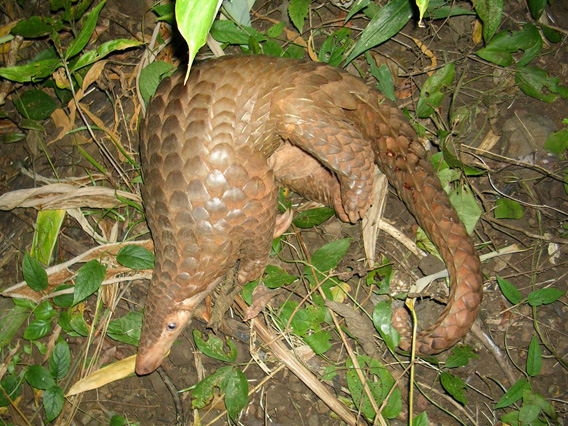Notebooks confiscated by the Sabah Wildlife Department (SWD) reveal that 22,000 Sunda pangolins (Manis javanica) were illegally poached from May 2007 to January 2009 in the Malaysian state in northern Borneo. The number, in fact, may be significantly higher since the logbooks didn’t cover over a third of the time period. The logbooks were analyzed by TRAFFIC, an organization devoted to combating the illegal trade in wildlife.
“TRAFFIC is grateful to the Wildlife Department for allowing us access to this information,” said Noorainie Awang Anak, Senior Program Officer with TRAFFIC Southeast Asia and an author of the report, in a press release. “The detailed record-taking by this criminal syndicate has given us a unique insight into the volumes of endangered pangolins being illegally traded in the region.”
Protected under Malaysian law and by CITES (the Convention on International Trade in Endangered Species of Wild Fauna and Flora), the pangolin is being illegally poached for its meat, and other scales which are used in traditional Chinese medicine. This unsustainable trade, in combination with deforestation, has pushed the Sunda pangolin to be classified as Endangered by the IUCN Red List. Despite a lack of hard data—given the mammals’ nocturnal and shy habits—researchers estimate that the Sunda pangolin’s population has dropped by 50 percent in just 15 years. It is suspected that most of the poached pangolins are headed for China.
Although few studies have been done on pangolin ecology, it is believed that are important for controlling the ant and termite populations on which they feed.
TRAFFIC also interviewed 13 local hunters on Sabah’s west coast. They reported that high prices for pangolin were spurring the trade, and, as poaching makes the species scarcer, the prices rise. Twelve of the 13 hunters interviewed said they believed the Sunda pangolin was going extinct.
“The pangolin smuggling crisis can only be addressed through improved law enforcement and better information on the criminal syndicates behind the trade,” said Awang. “Anyone with information on those behind these crimes against Malaysia’s natural heritage should pass it on to the relevant authorities for action.”

Sunda Pangolin (Manis javanica) in the wild. Photo by: Sandrine Pantel/TRAFFIC.
Related articles
China seizes over 2,000 illegally trafficked pangolins
(07/14/2010) Boarding a suspect fishing vessel in the early morning of June 6th, Chinese customs officials discovered 2,090 frozen pangolins and 92 cases of pangolin scales, weighing an astounding 3,960 pounds. Manned by five Chinese and one Malaysian national, the boat was awaiting instructions via satellite phone as to where to meet another ship to transfer the illegal cargo while still at sea.
Pangolins threatened by illegal trade for traditional Chinese medicine
(07/14/2009) While their trade has been prohibited under the Convention on International Trade in Endangered Species of Wild Fauna and Flora (CITES) since 2002, Asian pangolin populations are rapidly declining due to poaching for use in traditional Chinese medicine, report conservationists. Trade has nearly wiped out the species in Cambodia, Viet Nam and Laos, once strongholds for the scaly, toothless anteater.